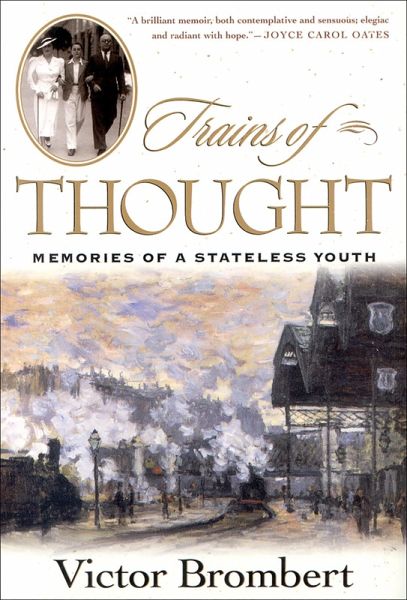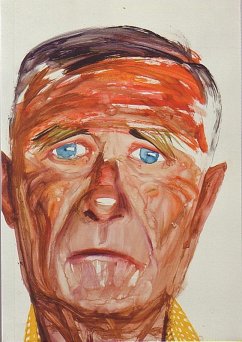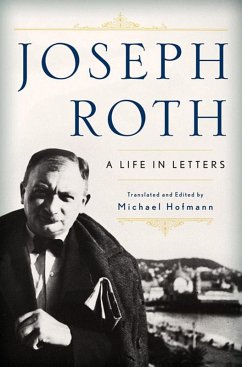
Trains of Thought (eBook, ePUB)
Memories of a Stateless Youth

PAYBACK Punkte
7 °P sammeln!
"A beautifully cadenced work of artit will remind some readers of Nabokov's classic Speak, Memory."Joyce Carol Oates Paris in the 1930smelancholy, erotic, intensely politicizedprovides the poetic beginning for this remarkable autobiography by one of America's most renowned literary scholars. In Trains of Thought Victor Brombert recaptures the story of his youth in a Proustian reverie, recalling, with a rare combination of humor and tenderness, his childhood in France, his family's escape to America during the Vichy regime, his experiences in the U.S. Army from the invasion of Normandy to the o...
"A beautifully cadenced work of artit will remind some readers of Nabokov's classic Speak, Memory."Joyce Carol Oates
Paris in the 1930smelancholy, erotic, intensely politicizedprovides the poetic beginning for this remarkable autobiography by one of America's most renowned literary scholars. In Trains of Thought Victor Brombert recaptures the story of his youth in a Proustian reverie, recalling, with a rare combination of humor and tenderness, his childhood in France, his family's escape to America during the Vichy regime, his experiences in the U.S. Army from the invasion of Normandy to the occupation of Berlin, and his discovery of his scholarly vocation. In shimmering prose, Brombert evokes his upbringing in Paris's upper-middle-class 16th arrondissement, a world where "the sweetness of things" masked the class tensions and political troubles that threatened the stability of the French democracy. Using the train as a metaphor to describe his personal journey, Brombert recalls his boyhood enchantment with railway traveleven imagining that he had been conceived on a sleeper. But the young Brombert sensed that "the poetry of the railroad also had its darker side, for there was the turmoil of departures, the terror . . . of being pursued by a gigantic locomotive, the nightmare of derailments, or of being trapped in a tunnel." With time, Brombert became acutely aware of the grimmer aspects of life around himthe death of his sister, Nora, on an operating table, the tragic disappearance of his boyhood love, Dany, with her infant child, and the mounting cries of "Sale Juif," or "dirty Jew," that grew from a whisper into a thundering din as the decade drew to a close. The invasion of May 1940 dispelled the optimistic belief, shared by most of the French nation, that the horrors that had descended on Germany could never happen to them. The family was forced to flee from Paris, first to Nice, then to Spain, and finally across the Atlantic on a banana freighter to America. Discovering the excitement of New York, Brombert nonetheless hoped to return to France in an American uniform once the United States entered the war. He joined the U.S. Army in 1943, and soon found himself with General Patton's old "Hell-on-Wheels" division at Omaha Beach, then in Paris at the time of its liberation, and later at the Battle of the Bulge. The final chapter concludes with Brombert's return to America, his enrollment at Yale University, and the beginning of a literary voyage whose origins are poignantly captured in this coming-of-age story. Trains of Thought is a virtuosic accomplishment, and a memoir that is likely to become a classic account of both memory and experience.
Paris in the 1930smelancholy, erotic, intensely politicizedprovides the poetic beginning for this remarkable autobiography by one of America's most renowned literary scholars. In Trains of Thought Victor Brombert recaptures the story of his youth in a Proustian reverie, recalling, with a rare combination of humor and tenderness, his childhood in France, his family's escape to America during the Vichy regime, his experiences in the U.S. Army from the invasion of Normandy to the occupation of Berlin, and his discovery of his scholarly vocation. In shimmering prose, Brombert evokes his upbringing in Paris's upper-middle-class 16th arrondissement, a world where "the sweetness of things" masked the class tensions and political troubles that threatened the stability of the French democracy. Using the train as a metaphor to describe his personal journey, Brombert recalls his boyhood enchantment with railway traveleven imagining that he had been conceived on a sleeper. But the young Brombert sensed that "the poetry of the railroad also had its darker side, for there was the turmoil of departures, the terror . . . of being pursued by a gigantic locomotive, the nightmare of derailments, or of being trapped in a tunnel." With time, Brombert became acutely aware of the grimmer aspects of life around himthe death of his sister, Nora, on an operating table, the tragic disappearance of his boyhood love, Dany, with her infant child, and the mounting cries of "Sale Juif," or "dirty Jew," that grew from a whisper into a thundering din as the decade drew to a close. The invasion of May 1940 dispelled the optimistic belief, shared by most of the French nation, that the horrors that had descended on Germany could never happen to them. The family was forced to flee from Paris, first to Nice, then to Spain, and finally across the Atlantic on a banana freighter to America. Discovering the excitement of New York, Brombert nonetheless hoped to return to France in an American uniform once the United States entered the war. He joined the U.S. Army in 1943, and soon found himself with General Patton's old "Hell-on-Wheels" division at Omaha Beach, then in Paris at the time of its liberation, and later at the Battle of the Bulge. The final chapter concludes with Brombert's return to America, his enrollment at Yale University, and the beginning of a literary voyage whose origins are poignantly captured in this coming-of-age story. Trains of Thought is a virtuosic accomplishment, and a memoir that is likely to become a classic account of both memory and experience.
Dieser Download kann aus rechtlichen Gründen nur mit Rechnungsadresse in A, D ausgeliefert werden.













